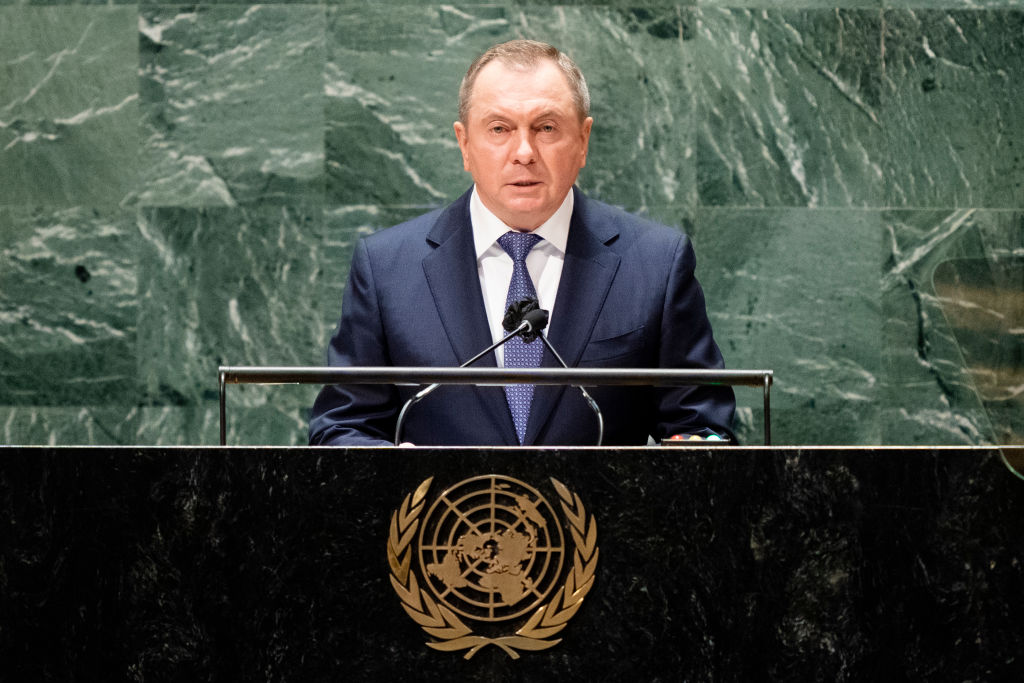Saturday’s news of the sudden death of Belarusian foreign minister Vladimir Makei, as well as the rather terse nature of the official notice, has raised the inevitable storm of instant speculation, revolving around notional Russian plots. In the process it has illustrated both some of the shortcomings of ‘instant punditry’ and the continuing significance of Alexander Lukashenko, dubbed ‘Europe’s last dictator’ (before Putin challenged for the title).
Lukashenko has been in power since 1994, and the whole system is built around him
The 64-year-old Makei had been in office since 2012, and apparently died of a heart attack shortly after an official visit to Armenia and two days before he was meant to meet his Russian counterpart, Sergei Lavrov.
An ex-military intelligence officer Makei was a long-time associate of Lukashenko’s, and as such was a weather-vane, who swung in line with his patron’s policies of the moment. Before 2020, he had been a key figure in attempts to cosy up with Europe in the hope of being able to play Brussels and Berlin off against Moscow to maintain Minsk’s strategic autonomy.
After the explosion of popular protests in 2020, and their brutal suppression, burning bridges with the West and forcing Lukashenko to depend on Putin, Makei seems to have had no problem in adapting. He denounced the protests as a western conspiracy. No wonder exiled opposition leader Sviatlana Tsikhanouskaya tweeted that he ‘betrayed the Belarusian people and supported tyranny.’
Makei would later affirm that Moscow had been provoked into invading Ukraine and that Kyiv should accept the Kremlin’s terms. In a feat of mendacity to rival Lavrov’s, he also claimed that there would be no attacks from Belarusian soil even as tanks were pouring over his country’s border with Ukraine and missiles launching from deep within its territory.
Nonetheless, as now seems almost traditional, the death of anyone even vaguely connected with Russia needs must be treated by some as suspicious, and the less evidence there is of foul play, the more that somehow proves that it was a really, really sophisticated assassination.
Thus, Russian-born émigré businessman Leonid Nevzlin affirmed that secret spook sources have told him that Makei ‘died as a result of poisoning developed in an FSB special laboratory,’ putting the blame on Putin’s infamous Federal Security Service.
Likewise, the deeply-implausible General SVR Telegram channel – which purports to be written by a serving or former Russian intelligence officer who somehow has sources of which the CIA or MI6 could only dream and yet has been able to post for years without being arrested – claimed that Makei’s death ‘was planned, prepared and implemented on the personal initiative of the President of Russia Vladimir Putin’ in order to intimidate Lukashenko into breaking off secret negotiations with the West.
Conversely, former Belarusian diplomat Pavel Latushka suggested that Makei fell foul of the KGB – Belarus’s thoroughly unreformed security service – because he ‘knew more about Lukashenko than any other person in the country.’
Honestly, who knows. Makei seemed in good health in Armenia and there is no doubt that the Kremlin kills when it feels it must. However, considering the clumsiness of the assassination we do know about – from the bungling Salisbury ‘tourists’ to the poisoning of opposition leader Alexei Navalny’s boxer shorts – it is always jarring to hear airy affirmations of Russian ninjas committing untraceable murders.
Claims that a panicked Lukashenko is replacing and redoubling his personal security after Makei’s death certainly seem unfounded.
Beyond a case study of how speculation (and deliberate disinformation) will fill any information vacuum these days, the story does emphasise the continuing importance of Belarus.
Lukashenko is a wily survivor, and is not going to become a vassal of Putin’s without a fight. The suggestion that Makei was involved in behind-the-scenes overtures to the West – he was shortly due to travel to Poland for a meeting of the Organisation for Security and Cooperation in Europe – is not entirely implausible. If Makei was making overtures to the west, though, it was because Lukashenko wanted him to: his successor will be no less an instrument of the boss’s will.
On the other hand, claims that Putin is planning to depose Lukashano and annexa Belarus are less so. Belarus’ KGB cooperates with the FSB, but with considerable suspicion on both sides. After all, it wasn’t so long ago that its main mission was turfing out Russian agents. Likewise, although the Belarusian military is helping train mobilised Russian reservists, its high command is largely clear of Moscow’s clients. It has, after all, lobbied hard against joining the war against Ukraine.
Lukashenko has been in power since 1994, and the whole system is built around him: toppling him and absorbing the country would have been hard enough in 2020, and Moscow has even less bandwidth and capacity now. Rather than Makei-ing a mountain out of a likely molehill, the odds are that we should expect that sometimes 64-year-olds have heart attacks.







Comments